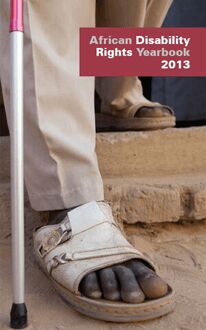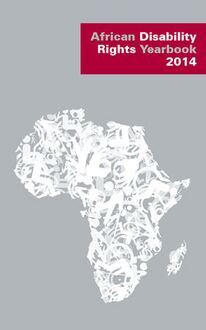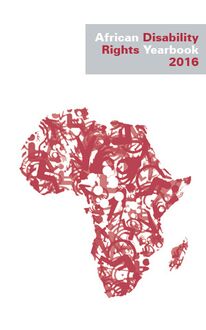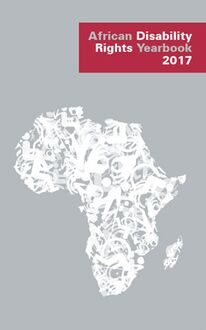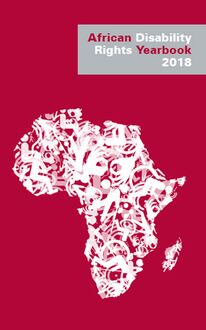-
 Univers
Univers
-
 Ebooks
Ebooks
-
 Livres audio
Livres audio
-
 Presse
Presse
-
 Podcasts
Podcasts
-
 BD
BD
-
 Documents
Documents
-
- Cours
- Révisions
- Ressources pédagogiques
- Sciences de l’éducation
- Manuels scolaires
- Langues
- Travaux de classe
- Annales de BEP
- Etudes supérieures
- Maternelle et primaire
- Fiches de lecture
- Orientation scolaire
- Méthodologie
- Corrigés de devoir
- Annales d’examens et concours
- Annales du bac
- Annales du brevet
- Rapports de stage
La lecture à portée de main
393 pages
English
African Disability Rights Yearbook Volume 1 2013 , livre ebook
393 pages
English
YouScribe est heureux de vous offrir cette publication

Description
The African Disability Rights Yearbook breaks new ground in disability scholarship. Coming in the wake of the United Nations Convention on the Rights of Persons with Disabilities, it is the first peer-reviewed journal to focus exclusively on disability as human rights on the African continent. It provides an annual forum for scholarly analysis on issues pertaining to the human rights of persons with disabilities. It is also a source for country-based reports as well as commentaries on recent developments in the field of disability rights in the African region.PrefaceThis is the first issue of the African Disability Rights Yearbook (ADRY). Drawing inspiration from the European Yearbook on Disability Law, it is the first publication of its kind that focuses on Africa. It aims to bring into prominence an area traditionally neglected by both African governments and academics. Following in the wake of the adoption of the United Nations Convention on the Rights of Persons with Disabilities, it is the first peer-reviewed journal to focus exclusively on disability as human rights on the African continent. The Yearbook, which is projected to appear annually, is set out in three sections. Section A contains academic articles: Section B consists of country-based research, charting recent developments on disability rights legislation, case law and policy developments in selected African states; and Section C deals with relevant developments in the African Union (AU) and African sub-regional organisations.The 2013 Yearbook aims to set out the situation as at 31 December 2012. The publication of the Yearbook in 2013 is a milestone in the engagement on the rights of persons with disabilities by the Centre for Human Rights, Faculty of Law, University of Pretoria, under whose auspices this publication was conceived and is being produced. It marks a highlight in the efforts taken by the Centre over the last few years to bring more academic attention to the rights of persons with disabilities in Africa. These efforts have only been possible with the support of the Open Society foundations, in particular, Open Society Initiative for Southern Africa (OSISA).Over the last years, OSISA has collaborated with the Centre for Human Rights, University of Pretoria, to strengthen the teaching and research in law faculties in the Southern Africa on disability rights. The collaboration consists of the following elements:(a) Efforts are made to assist in the building of capacity of law faculties in the region, through the attendance of the LLM (Human Rights and Democratisation in Africa) with a focus on disability rights by staff members from these law faculties, The staff members subsequently return to their faculties, institute and develop teaching on disability rights, and institutionalise faculty-based activities and ‘centres’ around disability rights.So far, the following faculties have participated: Universidade Eduardo Mondlane, Mozambique (Faculdade de Direito); the University of Botswana; the University of Malawi (Chancellor College, Faculty of Law); University of Namibia; Midlands State University, Zimbabwe (Faculty of Law); University of Zambia; and University of Dodoma (Tanzania); University of Namibia.These faculties/centres have the responsibility/mandate to research on disability rights; promote awareness and sensitise key stakeholders in the population about the rights of persons with disabilities and the existing legal framework; elaborate position papers and advocate for particular legal reforms; keep record of/identify and engage in litigation of selected cases pertaining to the violation of the rights of persons with disabilities; and provide legal advice to persons with disabilities.(b) The Centre presents a one-week intensive short course on disability rights to build capacity and to disseminate information on disability rights more broadly in Africa. This course is attended by participants from all over the continent.(c) Together, the participating faculties are developing a curriculum for the teaching of an undergraduate course on disability rights at law schools in the region.(d) Academic work on and awareness about disability rights is stimulated, in particular, through the publication of this Yearbook, an academic conference, and a first Southern African Disability Rights Moot Court Competition.This Yearbook is the accomplishment of many. It has been a project long in planning and preparation, and time consuming in execution. The publication is the endproduct of collaborations between the Centre and numerous partners, in particular (UWC).A very sincere and profound word of thanks goes to the following: The four editors: the convening editor, Prof Charles Ngwena, who joined the Centre for Human Rights last year; he worked with Dr Ilze Grobbelaar-Du Plessis (UP); Prof Helene Combrinck (UWC) and Dr Serges Djoyou Kamga (UNISA) as co-editors. It is only their dedication and devotion that has made this publication possible. Prof Ngwena was not only the convening editor, but also the editor in charge of Part A. He bore the brunt of the responsibility to keep the project going, and to inspire and lead all involved towards the ever-approaching deadline. Drs Grobbelaar-Du Plessis and Serges Djoyou Kamga took responsibility for Part B, and Prof Combrinck for Part C.They each sacrificed enormously in terms of time and energy, in order to get to this end product.Thanks to all contributors, and all reviewers of contributions, for dedicating themselves to this thankless task.Kate Painting acted as a most appreciated editorial assistant. She meticuoulsy followed up references, guaranteed consistency in style, and ensured felicitous language use. At the Centre, Thuto Moratuoa Hlalele, Yolanda Booyzen and Kevashinee Pillay also provided logistical and other support.The Yearbook is published by Pretoria University Law Press (PULP), based at the Faculty of Law, University of Pretoria. The patient and professional contribution of Lizette Hermann is much appreciated.We also thank the members of the advisory board, who agreed to assist with the policy direction, review of manuscripts and lending credibility and lustre to this Yearbook by associating themselves with this endeavour. The Yearbook is very fortunate to have representation from all corners of the globe, including individuals and institutions at the leading edge of disability rights research, training and teaching.Lastly, to the Open Society Foundation – and specifically OSISA – and its staff: Many thanks in particular to Louise Olivier, for her confidence, inspiration and consistent support, which took the Centre and me personally along an exciting and challenging new road; and to Louise Ehlers and Patricia Mwanyisa, who came on board later. Other Open Society staff also inspired and played important roles along the way.In line with the right of access to information and knowledge, this Yearbook is accessible freely as a free full downloadable document on the Centre’s website www.chr.up.ac.zaOn behalf of all those involved, and of the Centre, I wish to express the hope that this Yearbook will soon come to be regarded as an indispensable tool to understand and chart legislative and policy developments on disability rights in Africa, and that it will contribute to bridge the gap between the discourse of rights and its practical application and actual realisation.Frans ViljoenDirector, Centre for Human RightsAbout the editors:Charles Ngwena is Professor, Department of Constitutional Law and Legal Philosophy, Faculty of Law, University of the Free State, South Africa.Ilze Grobbelaar-du Plessis is a senior lecturer and holds the degrees BIuris LLB LLM LLD from the University of Pretoria.Helene Combrinck is Associate Professor at the Centre for Disability Law and Policy, University of the Western Cape.Serges Djoyou Kamgais is Senior Lecturer at TMALI (UNISA).
Sujets
Informations
| Publié par | PULP (Pretoria University Law Press) |
| Date de parution | 01 janvier 2014 |
| Nombre de lectures | 0 |
| Langue | English |
| Poids de l'ouvrage | 2 Mo |
Extrait
African Disability Rights Yearbook
Volume 1 2013
2013
African Disability Rights Yearbook
Published by: Pretoria University Law Press (PULP) The Pretoria University Law Press (PULP) is a publisher at the Faculty of Law, University of Pretoria, South Africa. PULP endeavours to publish and make available innovative, high-quality scholarly texts on law in Africa. PULP also publishes a series of collections of legal documents related to public law in Africa, as well as text books from African countries other than South Africa. This book was peer reviewed prior to publication.
For more information on PULP, see www.pulp.up.ac.za
Printed and bound by: Ultra Litho Johannesburg
To order, contact: PULP Faculty of Law University of Pretoria South Africa 0002 Tel: +27 12 420 4948 Fax: +27 12 362 5125 pulp@up.ac.za www.pulp.up.ac.za
Cover: Yolanda Booyzen, Centre for Human Rights
ISBN: 978-1-920538-19-4
© 2013
The financial assistance of the Open Society Initiative for Southern Africa is gratefully acknowledged
1
2
3
4
5
6
7
8
TABLE OF CONTENTS
PREFACE
EDITORIAL
SECTION A: ARTICLES
v
vii
The right to primary education of children with disabilities in Malawi: A diagnosis of the conceptual approach and implementation 3 Enoch MacDonnell Chilemba
Forgotten or included? Disabled children’s access to primary education in Cameroon 27 Serges Djoyou Kamga
Choice, support and inclusion: Implementing article 19 of the CRPD in Kenya 49 Elizabeth Kamundia
A critical analysis of the legal and institutional frameworks for the realisation of the rights of persons with disabilities in Zimbabwe 73 Esau Mandipa
Prospects and practices for CRPD implementation in Africa Janet Lord Michael Ashley Stein
97
‘Nothing about CRPD monitoring without us’: A case study on the involvement of the disability movement in policy-making in Zambia 115 Magdolna Birtha
Western Cape Forum For Intellectual Disability v Government of the Republic of South Africa: A case study of contradictions in inclusive education 139 Charles Ngwena
Towards an effective litigation strategy of disability rights: The Zambian experience 165 Likando Kalaluka
SECTION B: COUNTRY REPORTS
Cameroun Maître Christophe Tchudjo Joseph Ombe
Côte d’Ivoire Pierre Olivier Lobe
iii
193
207
Ghana Esther A Gyamfi
Mozambique Emerson Casimiro Uassuzo Lopes
Namibia Ruusa Ntinda
Nigeria Ngozi C Umeh Ramola Adeola
Republique Democratique du Congo (RDC) Pierre Olivier Lobe
South Africa Ilze Grobbelaar-du Plessis Chazanne Grobler
Tanzania Peter Josiah Shughuru
SECTION C: REGIONAL DEVELOPMENTS
221
245
261
277
291
307
341
Disability rights in the African regional human rights system during 2011 and 2012 361 Helene Combrinck
Making progress: The African Committee of Experts on the Rights and Welfare of the Child and the rights of children with disabilities 369 Lorenzo Wakefield
Disability rights in the sub-regional economic communities during 2011 and 2012 375 Lucyline N Murungi Aquinaldo Mandlate Benedicta Armah
iv
PREFACE
This is the first issue of theAfrican Disability Rights Yearbook (ADRY). Drawing inspiration from theEuropean Yearbook on Disability Law, it is the first publication of its kind that focuses on Africa. It aims to bring into prominence an area traditionally neglected by both African governments and academics. Following in the wake of the adoption of the United Nations Convention on the Rights of Persons with Disabilities, it is the first peer-reviewed journal to focus exclusively on disability as human rights on the African continent. TheYearbook, which is projected to appear annually, is set out in three sections. Section A contains academic articles: Section B consists of country-based research, charting recent developments on disability rights legislation, case law and policy developments in selected African states; and Section C deals with relevant developments in the African Union (AU) and African sub-regional organisations. The 2013Yearbook aims to set out the situation as at 31 December 2012.
The publication of theYearbookin 2013 is a milestone in the engagement on the rights of persons with disabilities by the Centre for Human Rights, Faculty of Law, University of Pretoria, under whose auspices this publication was conceived and is being produced. It marks a highlight in the efforts taken by the Centre over the last few years to bring more academic attention to the rights of persons with disabilities in Africa. These efforts have only been possible with the support of the Open Society foundations, in particular, Open Society Initiative for Southern Africa (OSISA).
Over the last years, OSISA has collaborated with the Centre for Human Rights, University of Pretoria, to strengthen the teaching and research in law faculties in the Southern Africa on disability rights. The collaboration consists of the following elements:
(a) Efforts are made to assist in the building of capacity of law faculties in the region, through the attendance of the LLM (Human Rights and Democratisation in Africa) with a focus on disability rights by staff members from these law faculties, The staff members subsequently return to their faculties, institute and develop teaching on disability rights, and institutionalise faculty-based activities and ‘centres’ around disability rights. So far, the following faculties have participated: Universidade Eduardo Mondlane, Mozambique (Faculdade de Direito); the University of Botswana; the University of Malawi (Chancellor College, Faculty of Law); University of Namibia; Midlands State University, Zimbabwe (Faculty of Law); University of Zambia; and University of Dodoma (Tanzania); University of Namibia. These faculties/centres have the responsibility/mandate to research on disability rights; promote awareness and sensitise key stakeholders in the population about the rights of persons with disabilities and the existing legal framework; elaborate position papers and advocate for particular legal reforms; keep record of/identify and engage in litigation of selected cases pertaining to the violation of the rights of persons with disabilities; and provide legal advice to persons with disabilities. (b) The Centre presents a one-week intensive short course on disability rights to build capacity and to disseminate information on disability rights more broadly in Africa. This course is attended by participants from all over the continent. (c) Together, the participating faculties are developing a curriculum for the teaching of an undergraduate course on disability rights at law schools in the region. (d) Academic work on and awareness about disability rights is stimulated, in particular, through the publication of thisYearbook,an academic conference, and a first Southern African Disability Rights Moot Court Competition.
ThisYearbookis the accomplishment of many. It has been a project long in planning and preparation, and time consuming in execution. The publication is the end-product of collaborations between the Centre and numerous partners, in particular
v
a long-standing partner, the Faculty of Law at the University of the Western Cape (UWC).
A very sincere and profound word of thanks goes to the following:
The four editors: the convening editor, Prof Charles Ngwena, who joined the Centre for Human Rights last year; he worked with Dr Ilze Grobbelaar-Du Plessis (UP); Prof Helene Combrinck (UWC) and Dr Serges Djoyou Kamga (UNISA) as co-editors. It is only their dedication and devotion that has made this publication possible. Prof Ngwena was not only the convening editor, but also the editor in charge of Part A. He bore the brunt of the responsibility to keep the project going, and to inspire and lead all involved towards the ever-approaching deadline. Drs Grobbelaar-Du Plessis and Serges Djoyou Kamga took responsibility for Part B, and Prof Combrinck for Part C. They each sacrificed enormously in terms of time and energy, in order to get to this end product.
Thanks to all contributors, and all reviewers of contributions, for dedicating themselves to this thankless task.
Kate Painting acted as a most appreciated editorial assistant. She meticuoulsy followed up references, guaranteed consistency in style, and ensured felicitous language use. At the Centre, Thuto Moratuoa Hlalele, Yolanda Booyzen and Kevashinee Pillay also provided logistical and other support.
TheYearbookis published by Pretoria University Law Press (PULP), based at the Faculty of Law, University of Pretoria. The patient and professional contribution of Lizette Hermann is much appreciated.
We also thank the members of the advisory board, who agreed to assist with the policy direction, review of manuscripts and lending credibility and lustre to this Yearbookby associating themselves with this endeavour. TheYearbook is very fortunate to have representation from all corners of the globe, including individuals and institutions at the leading edge of disability rights research, training and teaching.
Lastly, to the Open Society Foundation – and specifically OSISA – and its staff: Many thanks in particular to Louise Olivier, for her confidence, inspiration and consistent support, which took the Centre and me personally along an exciting and challenging new road; and to Louise Ehlers and Patricia Mwanyisa, who came on board later. Other Open Society staff also inspired and played important roles along the way.
In line with the right of access to information and knowledge, thisYearbookis accessible freely as a free full downloadable document on the Centre’s website www.chr.up.ac.za
On behalf of all those involved, and of the Centre, I wish to express the hope that thisYearbookwill soon come to be regarded as an indispensable tool to understand and chart legislative and policy developments on disability rights in Africa, and that it will contribute to bridge the gap between the discourse of rights and its practical application and actual realisation.
Frans ViljoenDirector, Centre for Human Rights
vi
EDITORIAL
The editors of theAfrican Disability Rights Yearbook(ADRY) are pleased to announce the publication of the first issue of theADRY. TheADRYis a peer-reviewed journal that is published once a year with 2013 as its augural year.
TheADRYin the wake of the adoption of the United Nations comes Convention on the Rights of Persons with Disabilities (CRPD) in 2006 and its ratification by an increasing number of states, including African states. The CRPD underscores the status of persons with disabilities as rights-bearers rather than recipients of charity. In its preamble, it underscores that persons with disabilities should have ‘full enjoyment of all human rights and fundamental freedoms on an equal basis with others’. Yet it is a truism that in the African region, the majority of persons with disabilities live in abject poverty and at the mercy of charity. Disability-related oppression, marginalisation and socio-economic exclusion remain deeply embedded in African socio-economic systems, notwithstanding that we are beginning to see promising signs of change and transformation is some African states.
The CRPD is paradigm-setting. It constitutes a shift from traditional ways of looking at disability as individual impairment to focusing on state obligations to dismantle adisablingenvironment and, in its stead, create anenablingenvironment which is inclusive and accommodates all human beings in their diversity. It is a call to arms for African human rights systems. The CRPD creates a new vision of disability and inclusive equality which must find its expression not merely in policy and lawmaking. More crucially, to overcome the legacy of systematic inequality and discrimination that persons with disabilities have endured and continue to endure, the vision of the CRPD and its injunctions require implementation at the domestic level. They require the African region and its people to transform the landscape of persons with disabilities in ways thatfulfildisability rights and tangibly guarantee equal participation in civil, political, economic, social and cultural spheres.
Against the backdrop of the CRPD and a changing human rights landscape for persons with disabilities, theADRYto contribute towards promoting the seeks respect, protection and fulfilment of disability rights in the African region through providing an annual forum for critically examining issues that pertain to the disability rights of individuals and peoples of the region, and reporting on disability rights-related developments at a country and African regional levels. It comprises three sections. Section A contains articles that interrogate critically contemporary human rights issues that are of concern to persons with disabilities in the Africa. Section B contains summaries or overviews of developments relating to the rights of persons with disabilities in selected countries. The section aims to report on a segment of African countries on a rotation basis each year. A country-based researcher is appointed for each country that is reported. The report is prepared using a standardised questionnaire or template. Section C – the last section – provides an overview of developments relating to disability rights at the sub-regional and regional level of the African Union.
Section A of this inaugural issue features articles by: Enoch MacDonnell Chilemba, examining the right to primary education of children with disabilities in Malawi; Serges Djoyou Kamga, also examining the right to primary education of children with disabilities but in respect of Cameroon; Elizabeth Kamundia, exploring the application of right of persons with disabilities to living independently and being included in the community in the context of Kenya; Esau Mandipa, analysing the legal and institutional frameworks for realising the rights of persons with disabilities in Zimbabwe; Janet Lord and Michael Ashley Stein, interrogating the implementation of the CRPD in the African region; Magdolna Birtha, examining the involvement of the disability movement in policy-making through a case study on Zambia; Charles Ngwena, critically appraising the decision of the Western Cape High Court inWestern Cape Forum for Intellectual Disability v Government of the Republic of South Africaas it applies to the right to education of learners with intellectual disabilities; and Likando Kalaluka,
vii
analysing the prospects and effectiveness of litigation pertaining to disability rights in Zambia. We extend our heartfelt gratitude to external reviewers who peer-reviewed contributions in this section.
Section B reports on the state of disability rights in the following countries: Cameroon by Christophe Tchudjo and Joseph Ombe; Côte d’Ivoire by Pierre Olivier Lobe; Ghana by Esther Gyamfi; Mozambique by Emerson Casimiro Uassuzo Lopes; Namibia by Ruusa Ntinda; Nigeria by Ngozi Umeh and Ramola Adeola; The Democratic Republic of Congo (DRC) by Florent Mubaya Kiwele Kya Bantu; South Africa by Ilze Grobbelaar-du Plessis and Chazanne Grobler; and Tanzania by Peter Josiah Shughuru. The reports on Côte d’Ivoire, Cameroon and the DRC appear in French. Where practicable, theADRYwill endeavour to publish country reports other than in English as part of accommodating diverse linguistic communities in the African region.
Section C on sub-regional and regional developments contains the following contributions: Helene Combrinck’s overview of a disability rights framework and developments in the African regional human rights system; Lorenzo Wakefield’s commentary on progress by the African Committee of Experts on the Rights and Welfare of the Child as they relate to the rights of children with disabilities; and commentaries on three economic sub-regions by: Lucyline Murungi on East Africa Community (EAC); Aquinaldo Mandlate on the Southern African Development Community (SADC); and Benedicta Armah on the Economic Community of West African States (ECOWAS).
We earnestly hope that theADRYwill contribute towards the promotion of disability rights in the African region. More pertinently, we hope that theADRY will become an invaluable forum and source for all stakeholders, including persons with disabilities, disabled peoples’ organisations, human rights advocates, judges, scholars, teachers, legislators, and policymakers as they consider ways of transforming the disability landscape at the domestic and/or regional levels in Africa in ways that complement the vision of the CRPD.
Editors Charles Ngwena(convening editor) Ilze Grobbelaar-du Plessis Helene CombrinckSerges Djoyou Kamga
viii
SECTION A: ARTICLES
THERIGHTTOPRIMARY EDUCATIONOFCHILDRENWITH 1 DISABILITIESINMALAWI: A HAPTER DIAGNOSISOFTHECONCEPTUAL C APPROACHAND IMPLEMENTATION
Summary
Enoch MacDonnell Chilemba*
The Convention on the Rights of Persons with Disabilities, which Malawi ratified in August 2009, affirms the recognition that disabled children are entitled to enjoy human rights such as primary education, including compulsory and free primary education, on an equal basis with others. However, almost 98 per cent of Malawi’s disabled children do not have access to education. This article observes that the situation could be attributed to the failure by the government of Malawi to conceptualise and implement the right to primary education for disabled children as envisaged by the international conceptual approaches and legal standards of inclusive education. The standards, as provided for in article 24 of the Disability Convention, emphasise the right of disabled children to attain compulsory and free primary education in mainstream schools together with all other children. Accordingly, this article explores the measures that Malawi could take to ensure a domestic implementation framework and conceptual approach that complies with international standards and approaches. This article first highlights the challenges that Malawi faces in the provision of primary education to disabled children before analysing the pertinent concepts such as inclusive education. It further discusses the applicable international legal standards before examining Malawi’s approach to the provision of primary education of disabled children. Ultimately, it evaluates Malawi’s constitutional, legislative and policy framework for the implementation of the right and suggests a number of measures that Malawi can implement in order to ensure compliance with international standards and conceptual approaches.
*
LLB (Hons) (Mal), LLM (UP, RSA), LLD Candidate & Doctoral researcher at the Community Law Centre & the Centre for Disability Law and Policy at the University of the Western Cape; Lecturer in Law at the Faculty of Law, University of Malawi; advocate of the High Court and Supreme Court of Malawi; enochilemba@yahoo.com. This work builds on the author’s LLM thesis, ‘A critical appraisal of the right to education of children with disabilities in Malawi’, submitted in partial fulfilment of the requirements of the LLM (Human Rights and Democratisation) Degree, (University of Pretoria) and also on the author’s current doctoral research.
(2013) 1ADRY3-263
-
 Univers
Univers
-
 Ebooks
Ebooks
-
 Livres audio
Livres audio
-
 Presse
Presse
-
 Podcasts
Podcasts
-
 BD
BD
-
 Documents
Documents
-
Jeunesse
-
Littérature
-
Ressources professionnelles
-
Santé et bien-être
-
Savoirs
-
Education
-
Loisirs et hobbies
-
Art, musique et cinéma
-
Actualité et débat de société
-
Jeunesse
-
Littérature
-
Ressources professionnelles
-
Santé et bien-être
-
Savoirs
-
Education
-
Loisirs et hobbies
-
Art, musique et cinéma
-
Actualité et débat de société
-
Actualités
-
Lifestyle
-
Presse jeunesse
-
Presse professionnelle
-
Pratique
-
Presse sportive
-
Presse internationale
-
Culture & Médias
-
Action et Aventures
-
Science-fiction et Fantasy
-
Société
-
Jeunesse
-
Littérature
-
Ressources professionnelles
-
Santé et bien-être
-
Savoirs
-
Education
-
Loisirs et hobbies
-
Art, musique et cinéma
-
Actualité et débat de société
- Cours
- Révisions
- Ressources pédagogiques
- Sciences de l’éducation
- Manuels scolaires
- Langues
- Travaux de classe
- Annales de BEP
- Etudes supérieures
- Maternelle et primaire
- Fiches de lecture
- Orientation scolaire
- Méthodologie
- Corrigés de devoir
- Annales d’examens et concours
- Annales du bac
- Annales du brevet
- Rapports de stage
Signaler un problème
YouScribe
Le catalogue
Le service
© 2010-2024 YouScribe
